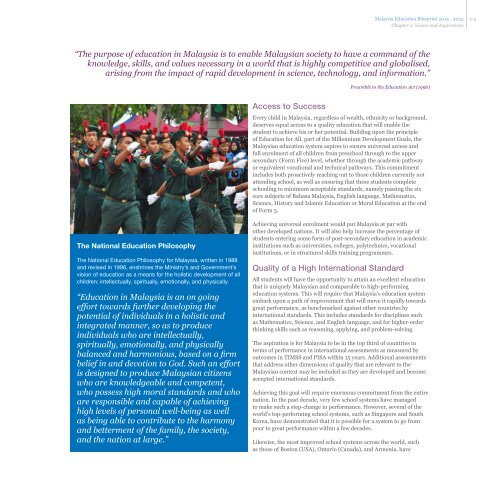Preliminary-Blueprint-Eng
Preliminary-Blueprint-Eng
Preliminary-Blueprint-Eng
Create successful ePaper yourself
Turn your PDF publications into a flip-book with our unique Google optimized e-Paper software.
Malaysia Education <strong>Blueprint</strong> 2013 - 2025<br />
Chapter 2 Vision and Aspirations<br />
“The purpose of education in Malaysia is to enable Malaysian society to have a command of the<br />
knowledge, skills, and values necessary in a world that is highly competitive and globalised,<br />
arising from the impact of rapid development in science, technology, and information.”<br />
the national Education philosophy<br />
The National Education Philosophy for Malaysia, written in 1988<br />
and revised in 1996, enshrines the Ministry’s and Government’s<br />
vision of education as a means for the holistic development of all<br />
children: intellectually, spiritually, emotionally, and physically.<br />
“Education in Malaysia is an on going<br />
effort towards further developing the<br />
potential of individuals in a holistic and<br />
integrated manner, so as to produce<br />
individuals who are intellectually,<br />
spiritually, emotionally, and physically<br />
balanced and harmonious, based on a firm<br />
belief in and devotion to God. Such an effort<br />
is designed to produce Malaysian citizens<br />
who are knowledgeable and competent,<br />
who possess high moral standards and who<br />
are responsible and capable of achieving<br />
high levels of personal well-being as well<br />
as being able to contribute to the harmony<br />
and betterment of the family, the society,<br />
and the nation at large.”<br />
Access to Success<br />
Preamble to the Education Act (1996)<br />
Every child in Malaysia, regardless of wealth, ethnicity or background,<br />
deserves equal access to a quality education that will enable the<br />
student to achieve his or her potential. Building upon the principle<br />
of Education for All, part of the Millennium Development Goals, the<br />
Malaysian education system aspires to ensure universal access and<br />
full enrolment of all children from preschool through to the upper<br />
secondary (Form Five) level, whether through the academic pathway<br />
or equivalent vocational and technical pathways. This commitment<br />
includes both proactively reaching out to those children currently not<br />
attending school, as well as ensuring that these students complete<br />
schooling to minimum acceptable standards, namely passing the six<br />
core subjects of Bahasa Malaysia, <strong>Eng</strong>lish language, Mathematics,<br />
Science, History and Islamic Education or Moral Education at the end<br />
of Form 5.<br />
Achieving universal enrolment would put Malaysia at par with<br />
other developed nations. It will also help increase the percentage of<br />
students entering some form of post-secondary education in academic<br />
institutions such as universities, colleges, polytechnics, vocational<br />
institutions, or in structured skills training programmes.<br />
Quality of a High international Standard<br />
All students will have the opportunity to attain an excellent education<br />
that is uniquely Malaysian and comparable to high-performing<br />
education systems. This will require that Malaysia’s education system<br />
embark upon a path of improvement that will move it rapidly towards<br />
great performance, as benchmarked against other countries by<br />
international standards. This includes standards for disciplines such<br />
as Mathematics, Science, and <strong>Eng</strong>lish language, and for higher-order<br />
thinking skills such as reasoning, applying, and problem-solving.<br />
The aspiration is for Malaysia to be in the top third of countries in<br />
terms of performance in international assessments as measured by<br />
outcomes in TIMSS and PISA within 15 years. Additional assessments<br />
that address other dimensions of quality that are relevant to the<br />
Malaysian context may be included as they are developed and become<br />
accepted international standards.<br />
Achieving this goal will require enormous commitment from the entire<br />
nation. In the past decade, very few school systems have managed<br />
to make such a step-change in performance. However, several of the<br />
world’s top-performing school systems, such as Singapore and South<br />
Korea, have demonstrated that it is possible for a system to go from<br />
poor to great performance within a few decades.<br />
Likewise, the most improved school systems across the world, such<br />
as those of Boston (USA), Ontario (Canada), and Armenia, have<br />
2-2


